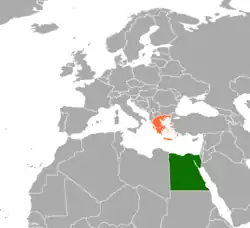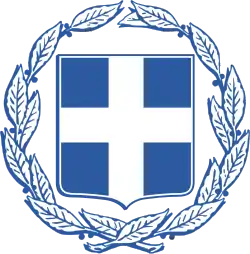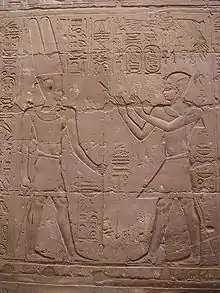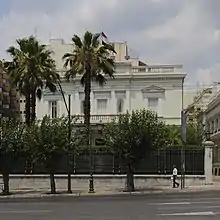Egypt–Greece relations
Egyptian–Greek relations refer to bilateral relations between Egypt and Greece. Due to the strong cultural and historical ties between the two nations, Egypt and Greece today enjoy friendly relations. Modern diplomatic relations between the two countries were established after Greece gained its independence in 1830, and are today regarded as cordial.[1] Both countries are members and partners in several international organizations such as UN, IMF, OSCE, and the Union for the Mediterranean, among others.
 | |
Egypt |
Greece |
|---|---|
Country comparison
| Coat of arms |  |
 |
| Population | 100,075,480 | 10,815,016 |
| Area | 1,002,450 km2 (387,048 sq mi) | 131,990 km2 (50,944 sq mi) |
| Population Density | 97/km2 (250/sq mi) | 85.3/km2 (221/sq mi) |
| Capital | Cairo | Athens |
| Largest City | Cairo – 7,734,614 (20,901,000 Metro) | Athens – 3,074,160 (3,737,550 Metro) |
| Government | Unitary semi-presidential republic | Parliamentary republic |
| Current leader | President Abdel Fattah el-Sisi Prime Minister Moustafa Madbouly |
President Katerina Sakellaropoulou Prime Minister Kyriakos Mitsotakis |
| Official languages | Arabic | Greek |
| Main religions | 85% Muslims, 15% Christians | 98% Christians, 1.3% Muslims, 0.7% Others |
| Ethnic groups | 99.7% Egyptians, 0.65% Others | 93.76% Greeks, 4.32% Albanians, 0.39% Bulgarians, 0.23% Romanians, 0.18% Ukrainians, 0.14% Pakistani, 0.12% Russians, 0.12% Georgians, 0.09% Indians, 0.65% Others |
| GDP (nominal) | US$275.748 billion ($ 3,261 per capita) | US$303.065 billion ($27,073 per capita) |
History

Due to the strong cultural and historical ties between the two nations, from ancient to modern times, especially since the creation of the city of Alexandria by the Greek king Alexander the Great, on the Eastern Mediterranean Sea's coast and the rich heritage strengthened further the bonds between the two nations, in addition to the Ptolemaic dynasty which ruled Egypt for 275 years, Egypt and Greece today enjoy warm diplomatic relations and consider each other a friendly nation. Egypt had also a sizable Greek community, mostly centered on Alexandria, which is today Egypt's second largest city and also the seat of the Greek Orthodox Patriarchate of Alexandria.
In 1825, during the Greek War of Independence, Ibrahim Pasha of Egypt came in assistance of the Ottomans and it was the Battle of Navarino and the Morea expedition that forced him to retreat.
After 1830, the two countries enjoyed good and warm diplomatic relations. They are developing on all fronts, with several trade, tourism, economic and defense cooperation agreements signed by the governments and heads of states in their regular meetings. During the 1950s Gamal Abdel Nasser expelled most of the Greek community from Egypt.
Relations later were improved. Greece is, today, Egypt's 6th largest foreign investor.[2][3]
In 2019, archaeologists reported that in two large tombs at Pylos, they found items, including a golden pendant depicting the head of the Egyptian goddess Hathor, which show that Pylos, had trading connections, previously unknown, with Egypt and the Near East around 1500 BC.[4]
Cooperation
The two states cooperate in the fields of trade, maritime, energy, culture and tourism, with Greece being the 4th largest European investor in Egypt, with over 208 Greek companies being active in the Egyptian market, while Egypt is Greece's 6th biggest trading partner.[5]
State visit by Evangelos Venizelos
Greek Vice-President and Minister of Foreign Affairs Evangelos Venizelos paid an official visit to Egypt on 5 September 2014, in an effort to bolster the relations between the two countries. In Cairo, Venizelos met with the government officials and discussed various matters of mutual interests, such as foreign investments to the country, trade, and shared opinions about the political situation in the Middle East, which concerns and affects both (Mediterranean) countries, as well tackling matters of mutual interest such as defining the EEZ boundaries between the two countries, and boosting further the cooperation between the two governments in international organizations and forums.[6]
Tripartite summits
2014 tripartite summit in Cairo between Egypt, Cyprus and Greece
Egyptian President Abdel Fattah el-Sisi, Cypriot President Nicos Anastasiades, and Greek Prime Minister Antonis Samaras held a tripartite summit in Cairo at 8 November 2014, where the leaders of the three countries tackled the ongoing issues in the region of Middle East and the East Mediterranean Sea, and the three heads of governments agreed to intensify the cooperation between the three countries in economy, security, tourism and energy, as well as defining the common maritime borders and the EEZ in the Mediterranean Sea.[7]
In the Cairo Summit, the governments of Greece and Cyprus condemned the terrorist attacks in Egyptian territory and the Mount Sinai, expressed political support to the Egyptian government, and agreed on mutual support between the three countries in international organizations and forums, with Greece and Cyprus advocating Egypt's positions in the European Union.
El-Sisi, Anastasiades and Samaras agreed to further encourage the foreign investments to the Egyptian economy and infrastructure, which suffered by the uprisings of Arab Spring, and to participate in the 2015 Cairo Economic Conference.[8]
2015 tripartite summit in Nicosia between Cyprus, Egypt and Greece
In less than half a year since the first tripartite Summit, a new high-level Summit was held at Nicosia, at 29 April 2015, between the heads of the governments of Cyprus, Egypt and Greece. In the Nicosia Summit, the Cypriot president Nicos Anastasiades, the Egyptian president Abdel Fattah el-Sisi and the Greek Prime Minister Alexis Tsipras, confirmed the will for bolstering further the cooperation between the three countries, and agreed on further cooperation in matters concerning the international organizations, as well as between the three countries. Among the matters discussed are the development of hydrocarbon reserves in Eastern Mediterranean, along the maritime border between both countries in their Exclusive Economic Zones.[9][10][11]
Official visits
State visit by Prokopis Pavlopoulos to Egypt
The president of Greece, Prokopis Pavlopoulos, paid an official visit to Egypt on 24 April 2015, in a bid for strengthening Greek-Egyptian relations, and intensifying the cooperation between the governments of the two countries, and tackle matters of mutual interest, such as the political situation in the Middle East and the illegal immigration which concerns both (Mediterranean) countries, as well as defining the maritime boundaries between the two countries.[12][13]
Resident diplomatic missions

- Egypt has an embassy in Athens and a consulate-general in Thessaloniki.
- Greece has an embassy in Cairo and a consulate-general in Alexandria.[14]
2020 agreement
On 6 August 2020, Egypt and Greece signed an agreement on the exclusive economic zone (EEZ) of the two countries. The main reason for the countries' decision to sign the agreement was to cancel the internationally and heavily criticized Libya–Turkey maritime deal but to also ease tensions in the Eastern Medditerenean. Turkey rapidly responded to the bilateral agreement, by calling it 'non-existent' because it goes against the agreement signed between Turkey and Libya. The agreement strengthened Egypt's and Greece's relation, something that both prime ministers mentioned.[15][16] On 27 August, the Hellenic Parliament ratified the maritime accord with Egypt.[17] Later on, the UN's Division for Ocean Affairs and the Law of the Sea published the agreement.[18]
See also
References
- "Egypt, Cyprus, Greece leaders talk EU, Turkey, Palestine". Retrieved 8 April 2016.
- "News Analysis: Egypt, Cyprus and Greece vow to expand cooperation at summit - Xinhua - English.news.cn". Retrieved 8 April 2016.
- Saturday 08-11-2014 11:57 AM. "Aswat Masriya - Sisi meets Greek PM ahead of Cairo tripartite summit". En.aswatmasriya.com. Retrieved 2016-10-20.
- Wade, Nicholas (December 17, 2019). "Tombs at Ancient Greek Site Were Gold-Lined Chambers" – via NYTimes.com.
- Kerry Kolasa-Sikiaridi. "Greece's Ambassador to Egypt: 'Greece Is the Fourth Largest European Investor in Egypt' | News from Greeks in Africa, Asia, and South America". World.greekreporter.com. Retrieved 2016-10-20.
- TO BHMA International (5 September 2013). "Venizelos to visit Egypt". TO BHMA International. Retrieved 8 April 2016.
- "Greece, Cyprus to represent Egypt's interests in EU". dailynewsegypt.com. November 8, 2014. Retrieved 8 April 2016.
- "Egypt, Greece, Greek Cyprus pledge to boost cooperation - Cyprus - Worldbulletin News". World Bulletin. Retrieved 8 April 2016.
- "Sisi, Greek, Cypriot leaders to hold tripartite summit in Nicosia". Cairo Post. Retrieved 8 April 2016.
- Wednesday 29-04-2015 01:03 PM (2015-04-29). "Aswat Masriya - Sisi holds summit with Cypriot counterpart in Nicosia". En.aswatmasriya.com. Retrieved 2016-10-20.
- "CyprusNewsReport.Com". CyprusNewsReport.Com. Retrieved 8 April 2016.
- A. Makris (24 April 2015). "President Pavlopoulos meets Egyptian counterpart - GreekReporter.com". Retrieved 8 April 2016.
- "Archived copy". Archived from the original on 2015-05-27. Retrieved 2015-05-27.CS1 maint: archived copy as title (link)
- Embassy of Greece in Cairo
- "Egypt and Greece sign agreement on exclusive economic zone, Egyptian FM says | Kathimerini". www.ekathimerini.com.
- "Τουρκικό ΥΠΕΞ: Ανύπαρκτη η συμφωνία Ελλάδας-Αιγύπτου". August 6, 2020.
- "Greek parliament ratifies maritime accord with Egypt". Reuters. 27 August 2020.
- "Agreement between the Government of the Hellenic Republic and the Government of the Arab Republic of Egypt on the delimitation of the exclusive economic zone between the two countries" (PDF). un.org. 24 December 2020.
Sources
- Dalachanis, Angelos (2017). The Greek Exodus from Egypt: Diaspora Politics and Emigration 1937-1962. London: Berghann. ISBN 978-1-78533-447-4.
.svg.png.webp)